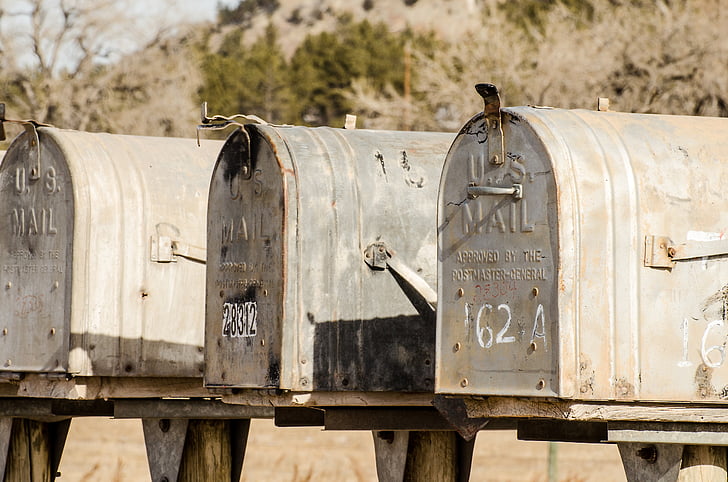When my parents married, they received a hand-painted wooden plaque from a friend. On it was a simple picture, just a rust-colored mailbox perched atop a wooden post. The post was planted in a patch of sparse grass and wildflowers. On the mailbox in curling script was their name. The little red mailbox flag was up, and the door was open and waiting for letters from family and friends.
This small picture, with its minute focus, spoke volumes. This painting portrayed marriage as being planted, being known, and being connected to community. My parents were no longer two individuals but now formed a family, and wherever they settled became home—a place at once rooted and welcoming to the wider world. In this picture, rooted relationships formed the basis for their identity.
My parents lived out this picture. They gave up the independence and endless options of big city singleness, and they planted themselves in rural Idaho. They put down roots and sent out shoots: five kids who were linked to the wider world via a cracked sidewalk, a mailbox, and the length of a curling phone cord. Though a computer arrived when we were older, our dial-up internet was so slow that we often abandoned the black and blinking screen to play outdoors. Our family didn’t have much, but what we had was rich in relationship and meaning. As we grew, though, so did a nagging suspicion that we were missing out. While our urban peers chatted on AIM and curated their Myspace accounts, we stacked firewood, rode bikes, and pined for independence.
This independence came with age: first, high-speed internet; then, a flip phone; and finally, a car. Social media followed hot on the heels of these freedoms, and our identity and place became more abstract—a space less physical and more imagined than the fixed past we’d flown from. We were no longer dependent on or defined by the community we’d come from. We could be who we wanted, how we wanted. And it was glorious.
About the time I got my first car (a clunky ’92 Mitsubishi Eclipse), our country was reaching “peak oil” and encountering a crisis—what to do in the face of dwindling energy reserves? As I was tentatively driving the finicky stick shift to grad school, concerned voices were calling for fewer cars and more limits on energy use.
Wendell Berry was one such voice. In May 2008, he wrote an article for Harper’s entitled “Faustian Economics: Hell Hath No Limits.” In it, Berry described an American public that would not let go of its pipe dream of gas-fueled independence—however short-lived and whatever the cost to our future selves. The cause of our “delusions of grandeur” and “national insanity,” Berry believed, was our collective fantasy of limitlessness. “[We] desire the ‘freedom’ of limitlessness” he said. “But this desire, paradoxically, reduces everything…and can reduce it finally to nothing.”
In the years since Berry’s piece was published, Americans have heeded at least somewhat the call to environmental responsibility and voluntary limits. My generation—Millennials—may seem to have embraced the restraints imposed on us by dwindling resources; we drive less than our predecessors, a shift so shocking that we have been labeled as the “go-nowhere generation.” And this trend toward eco-consciousness and reduced carbon emissions is even more pronounced with Gen Z. With life mostly online, having a car (or even a bike) is no longer a necessity for teens and young adults. In fact, a recent poll showed that about half of teens say that they are online “almost constantly.” Ming Zhang, Professor of Regional Planning at the University of Texas at Austin, describes Gen Z’s shift from external to internal mobility by saying: “Their thumbs have become much more mobile than their legs.” Our fossil fuel use has gone down as our internet use has gone up.
It is encouraging to see how some young people have embraced limits on energy consumption. But the underlying disease of rapacious desire has not been cured. No, this tradeoff only exchanges one delusion of grandeur for another. It swaps external limitlessness for internal limitlessness. With the swipe of our thumb, we can connect to anyone, anywhere, at any time—no ethanol required. What freedom!
Spending more time online, many find that “real life” pales in comparison to virtual reality. Many of us find in ourselves, as C.S. Lewis did, “a desire which no experience in this world can satisfy,” and we assume that we were made for another (perhaps virtual?) world. Our Instagram account or X experience is almost satisfying, so we pour more and more of ourselves into them, chasing an elusive sense of wholeness.
For some avant-garde thinkers, pushing the boundaries of time and space through online engagement is a half-measure. The limits we must be freed from, in their view, are within us: we must be unshackled from our biology and the societal constraints that keep us from self-actualization. The ultimate expression of this idea is found in queer theory, where philosophers like Judith Butler advocate for erasing all gendered and sexed categories that define and confine people. In Butler’s view, one should have no fixed identity—no mental “home” or “place” where a person can belong and from which they can express themselves bodily.
While some elect to use hormone blockers and surgeries to align their body with their psyche, these changes are invasive and often harmful. So many turn instead to the “embodied internet,” where with machine-generated reality they become their own makers, crafting digital paradises in conformity with their desires. One’s identity there can be fluid, flowing with the current of one’s mood. Yet given this fluidity, how can one form stable relationships in a metaverse where a pantheon of demigods are creating worlds in their own shifting images? If we can never know ourselves, how can anyone else—besides the AI algorithms we have sold our information (and our souls) to—know us?
A commitment to unbridled self-determination means there is no fixed point of reference, either outside of or within oneself. So we live a transient journey in exile from nationality, sex, and body. Even though, as David Bently Hart writes, “in a simulated world, only simulated selves could exist; no one — absolutely no one — ever will or could be at home there,” many persist in the delusion that life online is better because at least there we seem to control our destiny. Those who dwell online crave transcendence while denying the Transcendent. They imagine there’s no hell below and only sky above, and they receive the illusion that they are the makers of their own limitless destiny.
Berry connects our illusion of limitlessness to the idea of hell presented in Christopher Marlowe’s 1592 play Tragical History of Doctor Faustus. The main character of the play, Faustus, craves knowledge and power to the point that he deeds his soul to the devil in exchange for a quarter-century of service from a sub-devil, Mephistopheles. Faustus asks Mephistopheles why he left hell. Mephistopheles responds that wherever he goes is hell, stating: “Hell hath no limits, nor is it circumscribed in one self place, but where we [the damned] are is hell, and where hell is must we ever be.” When we reject the limits of our creatureliness—when we reject our Creator—we reject heaven, and everywhere we go is hell, limitless hell.
When we deny the One from whom and through whom and for whom are all things, we unmoor from Life itself. When we cut ties with our transcendental moorings, it is not just geography or people we are loosed from: we are unleashed from our very selves. Athanasius, in On the Incarnation, describes this state:
As they had at the beginning come into being out of nonexistence, so were they now on the way to returning, through corruption, to nonexistence again. The presence and love of the Word had called them into being; inevitably, therefore, when they lost the knowledge of God, they lost existence with it; for it is God alone, Who exists, evil is non-being, the negation and antithesis of good.
In turning from God, we turn from Existence itself, and as a result, we lose ourselves and our place. We are then left to drift on a sea of nihilism—nobodies paddling to nowhere. Sometimes we don’t realize how hellish life has become until waves of depression, loneliness, and aimlessness overwhelm us, and we face the jarring reality that “absolute independence is a false ideal. It delivers not the autonomy it promises, but loneliness and vulnerability instead.”
To break the spell of limitlessness that binds us, we must lose the illusion of control. Fifteen years ago, it was the looming loss of fossil fuels that seemed to snap us out of our reverie of reckless waste. What limit will it take today to shatter our illusory ideal of unbridled self-determination? Whatever it is, the shock of finitude will jolt us out of our fancied freedom and autonomy. Our glorious placelessness will shrink in proportion to the gaping hole and yawning emptiness of what we have lost.
My friend Sveta has endured such loss. She lost her husband to divorce, her daughter to an empty nest, and her business to COVID shutdowns. When Russia invaded Ukraine in 2022, she lost her homeland to war. In exile from Ukraine, she fled to the United States, eventually finding her way to small-town America where she is beginning to rebuild her life in unfamiliar territory. Not long after she arrived, I met her at a community English-language-learning program where I volunteered. Our friendship blossomed, and now we meet weekly to converse—her practicing her English and me polishing my rusty Russian.
We meet on Monday nights. She opens the door of her second-floor walk-up and beckons me from the cold darkness into her cozy apartment; often she has tea and biscuits artfully arranged on china she bought at the secondhand store around the corner. Sometimes she offers me homemade tvorog (farmer’s cheese), and I get a taste of the home she longs for. We talk, me sitting with legs dangling over the edge of her bed, and her sitting on the carpet facing me, back against the wall. Conversation ranges from life and childhood to heartache and hope. Then we open our Bibles. Sometimes we read from an English children’s Bible she found at the thrift store and sometimes from the pocket Russian Bible I was given years before.
This week, I open my Russian Bible and read from the Gospel of John, Chapter 1:
The Word became flesh and made his dwelling among us. We have seen his glory, the glory of the one and only Son, who came from the Father, full of grace and truth. (John 1:14)
As I read in halting Russian, Sveta corrects my pronunciation and explains words I don’t know. Then, she offers to read Chapter 2. When we finish, we pray. Sveta asks if I know Otche Nash (Our Father). I nod. She prays in Ukrainian, then I repeat the prayer in English:
Our Father in heaven,
hallowed be your name,
your kingdom come,
your will be done,
on earth as it is in heaven.
(Matthew 6:9-10)
Sveta, uprooted from her place, shows me the way home.
Wendell Berry believes that “to recover from our disease of limitlessness, we will have to give up the idea that we have a right to be godlike animals, that we are potentially omniscient and omnipotent, ready to discover the secret of the universe.” He is right.
To find our place means we give up our right to limitlessness. We give way to the only One worthy of limitlessness—the self-existent “I am”: our Father in heaven. We acknowledge His kingdom, His power, and His glory, and we find out who we are. We are exiles, forced from paradise by our desire for autonomy. But our Creator left His infinitude to become like us—finite and vulnerable. He came to live with us in exile and to show us the way back home. When we receive Him, we find our identity and our place. We become “children of God—children born not of natural descent, nor of human decision or a husband’s will, but born of God” (John 1:13). We become part of His kingdom, at home in the knowledge that the here and now is not the end but rather the beginning of endless life.
Some say that acknowledging God is a cop-out; we are just skirting the big issues and becoming so otherworldly that we are of no earthly good. This may be true of the metaverse, but it is not true of Christians. In fact, it is when we anchor ourselves to the reality that we are made by God (and not ultimate makers ourselves) that we are freed to live in the here and now.
When we pray for God’s kingdom to come, it comes in the way God came to us—with flesh and blood and friendship. It comes as love incarnate, dwelling among us. It comes as love that transforms us and defines us, love that welcomes us home and draws us into community. God’s love roots us. And His love sends out shoots of blessing to the world around us. We become image bearers of our Father, inviting others out of exile and back to paradise. We embrace our insufficiency because it reminds us of our need for God and others. And in accepting our inadequacy, we learn what Wendell Berry means when he writes that “our human and earthly limits, properly understood, are not confinements but rather inducements to formal elaboration and elegance, to fullness of relationship and meaning.”
Looking downward towards the glow of a screen or inward to the darkness of our soul does not free us. We must look upward to our Father and outward toward community, acknowledging our finitude and affirming that His is the kingdom and the power and the glory forever. And we are His.





1 comment
Martin
“But the underlying disease of rapacious desire has not been cured. No, this tradeoff only exchanges one delusion of grandeur for another.” True, but we don’t need a sermon to recognize that.
The expectation of imminent collapse (promoted by doomsayers like Paul Kingsnorth) might be due more to obliviousness than “disease”. As the old saying goes, never assume conspiracy when incompetence might be a better explanation.
For example, despite the pandemic + online shopping double whammy reducing automobile use, we still see “divest oil” placards and screams on college campuses. Why not divest cobalt? That’s a key element in hitech devices that the laptop class depends on, but there are only sporadic mainstream news articles about the “rapacious” mining practices in Africa. The shift in habit from car to computer has not led to a shift in social justice topic du jour.
Sarah also wrote: “Yet given this fluidity, how can one form stable relationships in a metaverse where a pantheon of demigods are creating worlds in their own shifting images?” Very easy, by denying hell below while assuming there is only heaven above, as you say a paragraph later.
The “niceness” ethos began decades before social media. When informed of another person’s interest in the paranormal, astrology, meditation, or any other non-mainstream quasi-spiritual pursuit, politeness dictated that you should say “that’s great” rather than question whether it was nonsense, or perhaps a false teacher on a true path.
In other words, relationships online simply follow this old pattern: whatever your bestie or ally or online friend says they have become interested in (fluidity) must be “stroked” with purring words rather than questioned, lest they in turn question the validity of whatever you choose to do next (identity threat).
Comments are closed.